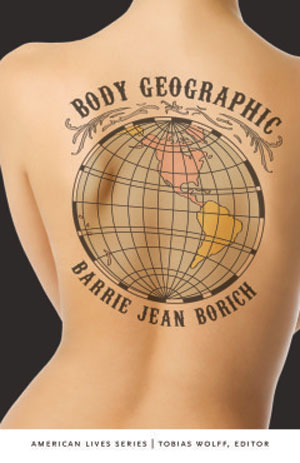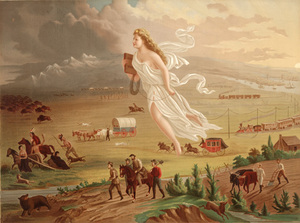| « Extraordinarily Ordinary: Author Alice McDermott @ Music Box Theatre | Daniela Olszewska Introduces Citizen J, Artifice Books' Newest Title » |
Books Tue Sep 24 2013
Book Review: Barrie Jean Borich's Body Geographic
 Body Geographic by Barrie Jean Borich is concerned with maps and middles and maps of middles: the Midwest, middle age, the middle class, even a city skyline tattoo inked across the author's back. And some actual cities, too. Borich grew up in the steel-mill neighborhoods of Chicago's southeastern edge, was educated partly in Champaign-Urbana, and now splits her time between Minneapolis and Chicago, where she teaches at DePaul.
Body Geographic by Barrie Jean Borich is concerned with maps and middles and maps of middles: the Midwest, middle age, the middle class, even a city skyline tattoo inked across the author's back. And some actual cities, too. Borich grew up in the steel-mill neighborhoods of Chicago's southeastern edge, was educated partly in Champaign-Urbana, and now splits her time between Minneapolis and Chicago, where she teaches at DePaul.
She lives, it seems, a comfortable lesbian academic life--complete with avid antique shopping and couch sex interrupted by dogs with names like Miss Dusty Springfield--and mostly has done so, save for a troubled spell as a young, alcoholic college dropout. If this does not sound too thrilling, well, the Midwest is not known for its captivating geography. But Borich is mainly concerned here not with travelogue or zippy plotting; metaphors are her great love. Her poet's sense of yearning haunts the heart of an ever-eager English major.
The primary metaphor, naturally, is the atlas, a conceit that gives loose form to the book via vaguely cartographic subsections. If you're already the sort to pore over maps, you may wish there were even more in this vein--and wish that the very interesting actual old maps interspersed throughout were printed larger, clearer, perhaps in color.
When maps are metaphors, I suppose you don't particularly need to see the street names. We do get a few close-up glimpses of the Southeast Side terrain of Borich's childhood, from her "druggy disco-hating art-rock" neighborhood friends in the early '70s to an abandoned grain mill dubbed the Rat Factory. This grubby city is contrasted with the "alabaster city" of the 1893 Columbian Exposition (and the contrast becomes another central metaphor; later, emigrations and floods, among other things, are thrown liberally into the symbolic stew). Early in the book, Borich has a dream in which shades of fin de siècle citizens walk the modern streets and wakes wishing for "a map I could inhabit, a city tangibly conscious of the city that had come before."
She has one model for what it would mean to live viscerally alongside the past while inside the present: her grandmother, a very old woman living in Florida among the last intermittently flashing scraps of her memory. Gram Rose's mind has itself become a sort of palimpsest, the last few decades' partial erasure allowing her idea of herself as a globe-trotting young nurse to strongly shape her concept of herself. For someone with dementia, little work is needed to make the boundaries between past and present porous.
 Against such involuntary erasures, Borich posits the body, hers being blonde, amply cleavaged (we're repeatedly invited to consider her love of low necklines), and overlaid with tattoos that mark the passing of time and changing of place. This leads her to cheekily cast herself as the titular giantess of John Gast's 1872 painting American Progress, who dreamily plants telephone poles across the Great Plains while sending stagecoaches scattering for cover.
Against such involuntary erasures, Borich posits the body, hers being blonde, amply cleavaged (we're repeatedly invited to consider her love of low necklines), and overlaid with tattoos that mark the passing of time and changing of place. This leads her to cheekily cast herself as the titular giantess of John Gast's 1872 painting American Progress, who dreamily plants telephone poles across the Great Plains while sending stagecoaches scattering for cover.
The painting is indeed a good visual allegory for manifest destiny and for the "little bit of empire building in our makeup" Borich sees in herself and in all Americans when we strive to claim cities as our homes and people as our own. It's also a sort of cartoon of the memoirist's work itself. The author strides through the landscape of her life stringing up connecting wires, drawing every time and place she crosses into one big conversation.
In Body Geographic, her path zigzags constantly as she links far-flung experiences to themes that can be as slight as her elderly mother's dissatisfaction with her coffeemaker. (It's a metaphor for the American Dream, sort of.) Sometimes you might wish the author would stop for a moment and look around at greater length, letting characters and places come into sharper focus. And perhaps we will get more of that in a future volume--this memoir-in-essays is her third, following the well-reviewed My Lesbian Husband. More than anything, Borich's work so far demonstrates that she's determined to wring all the meaning she can from her slice of middle-American life.
American Progress image courtesy of the Library of Congress Prints and Photographs Division.









